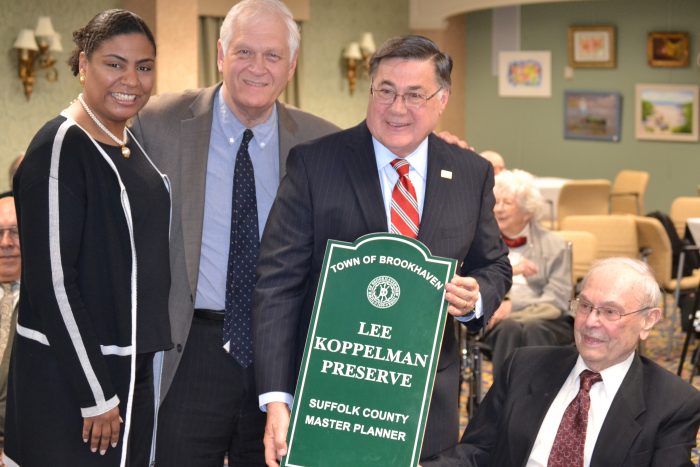Koppelman remembered as a pioneer, visionary

After the passing of Lee Koppelman, Suffolk County’s first regional planning board director, he is remembered fondly by those who knew him and his considerable work.

Koppelman, of South Setauket, died on March 21, at age 94, at Stony Brook University Hospital.
“Lee Koppelman was a true pioneer whose comprehensive vision for sustainable development on Long Island was well ahead of his time and laid the foundation for countless initiatives we are still pursuing to this day,” said County Executive Steve Bellone (D) in a statement. “Lee’s push, against political backlash, to preserve open space, manage coastal erosion and improve water quality has had a lasting impact that spans generations.”
Bellone added, “As a county, we continue to pull his ideas ‘off the drawing board,’ with more than 20,000 acres of open space and farmland being preserved, as well as continued investments into downtown sewering, water quality improvements and public transit corridors.”
Before his illustrious career, Koppelman was born in Harlem on May 19, 1927. He grew up in Astoria and graduated from Bryant High School in Queens. His parents owned greenhouses in addition to a flower shop in Manhattan.
Koppelman was a Navy veteran who joined in 1945. He held a bachelor’s degree in electrical engineering from City College of New York and a master’s degree from Pratt Institute. He also earned a doctorate in public administration from New York University.
After he was married, Koppelman and his wife, Connie, moved to Hauppauge, where the planner, then president of the Hauppauge Civic Association, would play an instrumental role in the development of the Hauppauge Industrial Park.
In 1960 the Koppelmans moved to Smithtown and in the late 1980s to East Setauket. In 2014, he and his wife moved to Jefferson Ferry’s independent living in South Setauket. According to his son Keith, Koppelman designed and built his homes in Hauppauge, Smithtown and East Setauket.
Koppelman served as the first Suffolk County regional planning board director for 28 years, from 1960 to 1988, and also served as the executive director of the Nassau-Suffolk Regional Planning Board from 1965 to 2006. He was an early advocate for preserving open space and was responsible for drawing up Suffolk’s first comprehensive master plan in 1970.
In an article by historian Noel Gish posted to the Stony Brook University website, he described Koppelman as “a planning gymnast, contorting and twisting his way through the development of the post-World War II period on Long Island.”
In addition to his accomplishments in his planning career, Koppelman was a professor emeritus at Stony Brook University, where he taught until last semester, according to his son. In 1988, he was appointed director of the Center for Regional Policy Studies at the school. The center handles research projects including governmental productivity, strategic economic planning and environmental planning.
“Lee Koppelman was a true pioneer whose comprehensive vision for sustainable development on Long Island was well ahead of his time and laid the foundation for countless initiatives we are still pursuing to this day.”
— Steve Bellone
According to his profile on the university’s website, his focus was “the environmental policy aspects of regional planning and has been specifically directed toward coastal zone management.”
Among his accomplishments listed on the SBU website, he was project manager for research “including coastal regional planning, comprehensive water management, shoreline erosion practices and related studies.” He was also involved “in the development of synthesis techniques for relating coastal zone science into the regional planning process.”
Leonie Huddy, distinguished professor and chair of the Department of Political Science, said Koppelman was “a leading member of the Stony Brook Political Science Department for over five decades and trained generations of local and regional leaders and policy analysts. He will be sorely missed.”
Koppelman also served as executive director of the Long Island Regional Planning Board and was chairman emeritus of the Town of Brookhaven Open Space and Farmland Acquisition Advisory Committee.
A 46-acre parcel of woodlands near the Stony Brook campus was named after him during a ceremony in April of 2018. Now known as Lee E. Koppelman Nature Preserve, the property east of Nicolls Road and south of the university has been owned by the Town of Brookhaven for nearly 50 years and was used as passive open space.
Brookhaven Town Supervisor Ed Romaine (R), who was a county legislator in the 1980s, said in a phone interview he worked closely with Koppelman during his time in the Legislature working on open space acquisitions in Suffolk County. Romaine was able to get one of the largest acquisitions with the former Havens Estate in Center Moriches. The acquisition included 263 acres of land, now known as Terrell River County Park, that sits from Montauk Highway south to Moriches Bay. He also worked with Koppelman on other acquisitions.
In later years, Koppelman hired Romaine, a former full-time teacher, to teach a graduate course at SBU in 2005. He described Koppelman as gifted and intelligent. He said the two may not have always agreed on matters, “but I always thought his heart was in the right place.”
“I thought he was a visionary, and people say, ‘Well, what does it mean to be a visionary or to have vision,” Romaine said. “Well, vision is the art of seeing what is invisible to others. He made quite visible to us the possibility of things that we should be working on as a county in terms of farmland acquisition, preservation, where development should take place.”
Romaine said he counts himself among others who “are beginning to see that his vision was for the, most part, the correct vision for the future of Long Island, and we regret those things where past leaders did not have the same vision — it was invisible to them to see what he was saying, what his vision was.”
The town supervisor said many would visit Koppelman’s office at SBU to seek advice.

“He was a guy with a tremendous amount of knowledge,” Romaine said. “He will be missed for a long time, and his contributions will go on long after his passing, so I have nothing but absolute praise for Lee Koppelman and his efforts to make sure that Long Island was somewhat more rational than it is today.”
State Assemblyman Steve Englebright (D-Setauket) said Koppelman was a superb administrator who knew how to surround himself with expert master planners. He said Koppelman and the planners “reflected a sense of mission and a sense of strength,” and he leaves behind a great legacy.
“In the years in which sprawl was a menace, every morning, there was Lee Koppelman and his cadre of top-flight planners who offered another vision for Long Island and made a difference, and enabled us to really bring thought into the experience of what appeared to be a daily exercise in chaos on the roadways and in the hallways where approvals for construction were being granted,” Englebright said. “He was a breath of fresh air.”
Englebright said Koppelman’s legacy will continue.
“The expectation, which is really built on of his legacy, is that we will plan, we will reason and we will make thoughtful decisions regarding our land use and natural resource uses,” Englebright said.
Koppelman is survived by his wife, Connie; four children Lesli, Claudia, Laurel and Keith; and three grandchildren Ezra, Ora and Dara. A funeral was held Thursday, March 24, at Shalom Memorial Chapels in Smithtown.
“We shared our father’s time and attention with the entire community of Long Island,” Keith Koppelman said in an email. “We have always been and will remain incredibly proud of him. Working for a rational future for Long Island did take him away from us at times, but now we have reminders of him everywhere we travel on the Island.”






